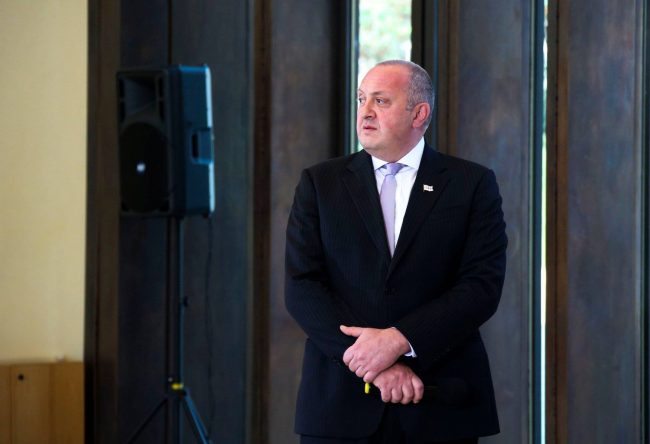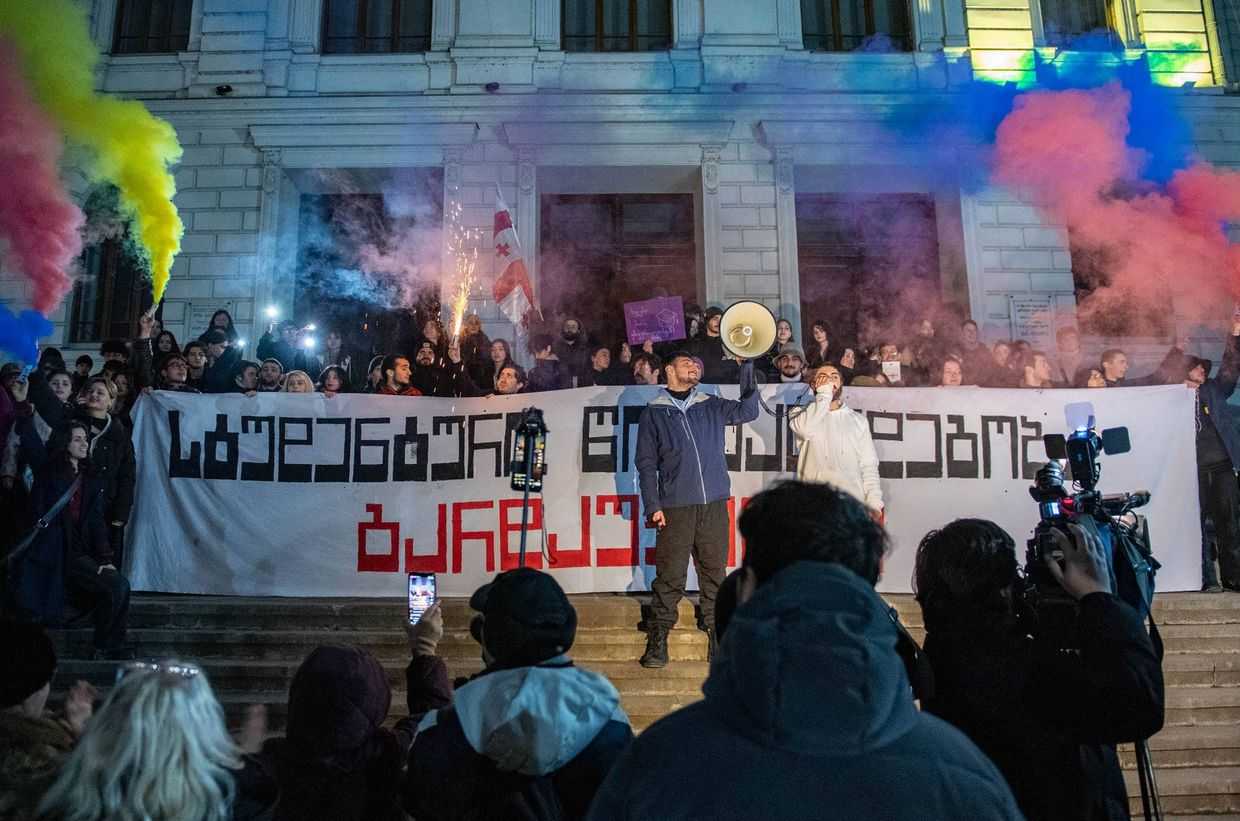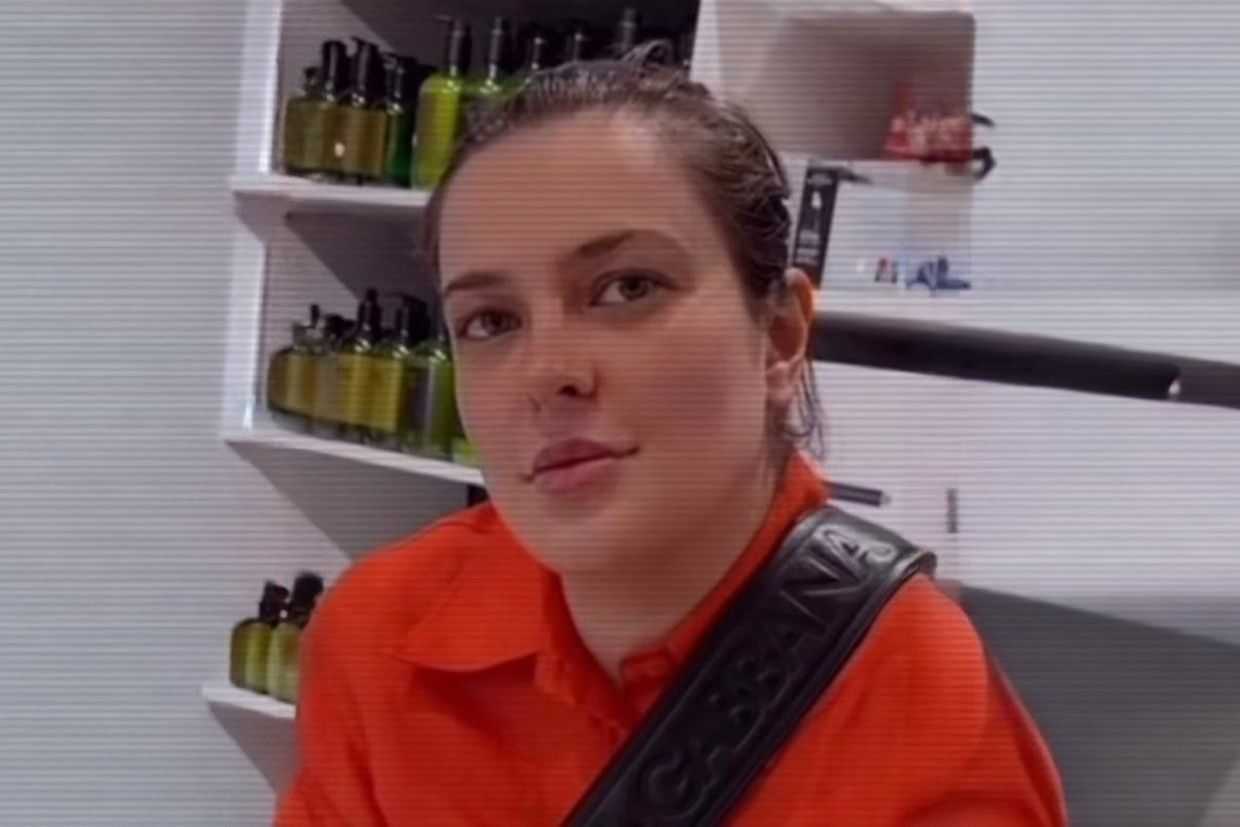

 Georgian President Giorgi Margvelashvili has come under fire from civil society groups as well as ruling party and opposition MPs for refusing to nominate a candidate to head the Supreme Court. Some critics warned the move could allow a ‘dominant group of judges’ on Georgia’s High Council of Justice to strengthen their grip over the judiciary.
Georgian President Giorgi Margvelashvili has come under fire from civil society groups as well as ruling party and opposition MPs for refusing to nominate a candidate to head the Supreme Court. Some critics warned the move could allow a ‘dominant group of judges’ on Georgia’s High Council of Justice to strengthen their grip over the judiciary.
The President’s administration announced a nomination would be pointless ‘due to the absence of consensus’, after the ruling Georgian Dream Party refused to participate in the selection process.
Following the unexpected resignation on 3 August of the court’s previous chairperson, Nino Gvenetadze, several prominent local NGOs called for the president to name her successor as soon as possible. Constitutional changes taking effect after October’s presidential election will mean the Supreme Court’s chairperson will in future be selected by the High Council of Justice, instead of parliament voting on a presidential nominee. The new chairperson will hold the office for 10 years.
Gvenetadze’s resignation for ‘health reasons’ sparked speculations she may have been pressured to quit. Gvenetadze herself claimed to be ‘victim of violence’ on the High Council, and President Margvelashvili pointed to ‘harsh conditions’ in the court system.
[Read on OC Media: Georgian Supreme Court head’s resignation raises questions if she was pressured]
The High Council, an independent body responsible for appointing and dismissing judges, has been accused by some members, as well as several civil society groups, of being ruled by an influential cabal of judges.
On 24 August, Giorgi Abashishvili, head of the President’s Administration, said the president would not present a candidate to parliament. He said a candidate could only be approved with a ‘broad consensus’, which he said ‘unfortunately, couldn’t be achieved’. He added that the president’s decision came after Georgian Dream announced they would not participate in the consultation process.
After holding meetings with a number of civil society groups, on 20 August, the president suggested that they should name their preferred candidate, who he would then submit to parliament.
‘A candidate chosen by you will have a high level of public legitimacy along with high political legitimacy provided by my submission and parliament’s voting’, said Margvelashvili on 20 August.
The groups refused, calling on Margvelashvili to take political responsibility and name one himself.
Margvelashvili responded to criticisms against him in a statement on Friday evening clarifying his decision.
‘As you know the constitution will change in several days and neither I nor the new president will be able to name a Supreme Court Chairperson. Secondly, it’s been more than a year since I presented three candidates for judge’s positions and parliament still hasn’t voted on them. Thirdly, Georgian Dream has openly declared that they won’t consult with me on this topic, meaning they would not approve of my candidate’ said Margvelashvili.
He added that it was unclear to him why his suggestion that he nominate a candidate chosen by legal professionals was rejected.
‘I’m very frustrated this consensus couldn’t be reached. Moreover, no steps were taken towards this. I’m heartbroken because the judiciary system has always worried me and I’ve always been trying to act on this’, said Margvelashvili.
‘Take political responsibility’
Sopo Verdzeuli, a lawyer from rights group the Human Rights Education and Monitoring Centre (EMC), criticised the president’s proposal, accusing him of creating a deadlock despite knowing that NGOs would not agree to his suggestion. EMC was one of the organisations Margvelashvili consulted with.
‘The format he suggested was ambiguous and inconsistent with the logic of the current constitution’, Verdzeuli told OC Media.
‘I wonder why he decided to push a format he knew we didn’t agree with. We couldn’t manage to agree on one thing — that he shouldn’t be only a technical part of the process who’d submit a candidate proposed by us. It was very important he take political responsibility and choose a candidate himself. I think there still is a time for him to change his decision’, said Verdzeuli.
‘Even though there is a risk parliament may not vote for a candidate chosen by the president, it is parliament’s political responsibility and burden to carry’, she added.
Verdzeuli said she now expected the High Council to take over in the selection process and appoint Gvenetadze’s successor from ‘their affiliates’.
‘This is why neither the president nor parliament should have allowed this kind of a deadlock. As we can see, none of the institutions was ready for this’, said Verdzeuli.
‘Something wrong in the judiciary’
A report by Transparency International Georgia published in July suggested that there was a dominant group of judges within the High Council of Justice that ‘influences [other] judges, which in turn increases opportunities for corruption’. Ana Dolidze and Nazi Janezashvili, both members of the High Council, have been critical of the system, referring particularly to this ‘dominant group’.
Janezashvili, who is a non-judge member of the High Council, told OC Media the president should have named a candidate in order to ‘ensure that Chinchaladze’s clan isn’t strengthened further’. Mikheil Chinchaladze was one of 10 judges named in the Transparency International report.
Janezashvili said he fears if the president does not name a candidate, one will be selected by this group and further strengthen their grip on the judiciary.
‘It’s really important not to strengthen the clan further, or it will be a message to the judiciary that judges are under the influence of Chinchaladze, of the clan, who have the power to launch disciplinary proceedings’, said Janezashvili.
She said she was hopeful the president would consult with other members of the High Council regarding a candidate, given that the previous chairperson’s resignation ‘indicated that there is something wrong in the judiciary’.
‘It’s pretty much impossible the council will name a candidate not affiliated with the clan. The candidate must be a supreme court judge. There will be around 10 judges there by that time and the new constitution urges us to have at least 28. We don’t know what the council will decide: fill the court with their affiliates or nominate the chairperson first. Whichever happens first matters a lot as well’, Janezashvili told OC Media.
‘Trying to blame it on Georgian Dream’
The president’s decision was criticised by a broad political spectrum, including figures from both the ruling and main opposition parties.
Parliamentary Chair Irakli Kobakhidze said Margvelashvili’s actions were surprising given that ‘submission of Supreme Court Chairperson candidacy is the constitutional responsibility and prerogative of the president. His decision has been denounced by many already, therefore I won’t add anything else to it’, said Kobakhidze.
Mamuka Mdinaradze, an MP from Georgian Dream, said the move was ‘inadequate’, and that Margvelashvili ‘didn’t take responsibility for his constitutional right and [is] trying to blame it on Georgian Dream’.
Concerns over the president’s decisions were also expressed by members of the opposition United National Movement and European Georgia parties.








